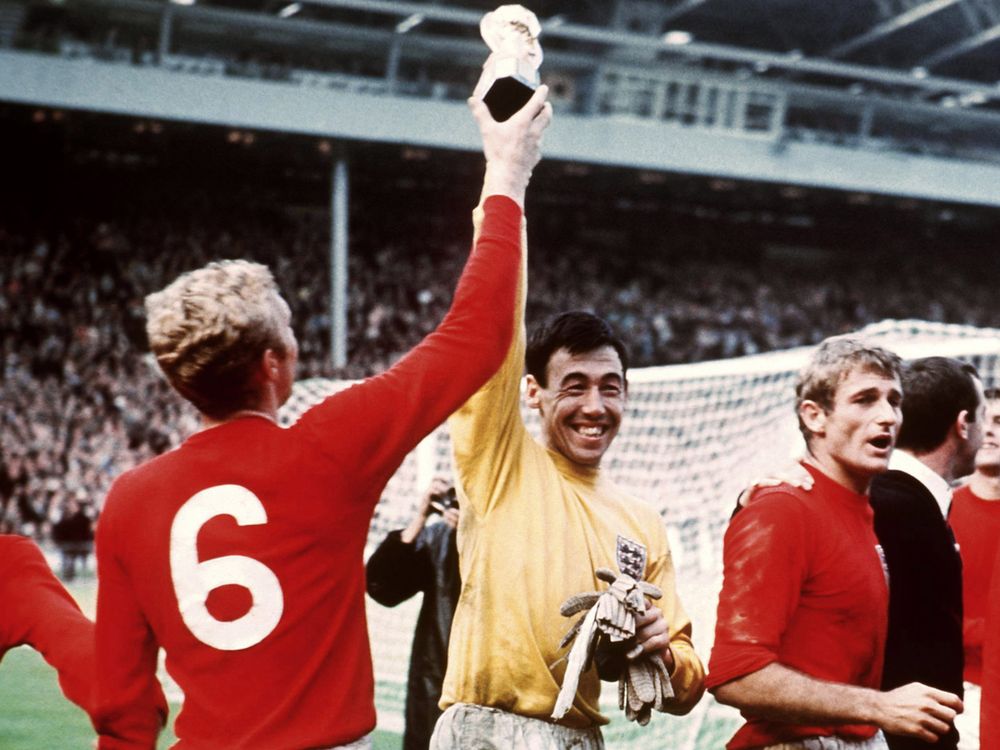
It would be irresponsible of us if this week’s Supremo didn’t go to our Number 1 choice, Sir Alf Ramsey’s Number 1 choice and the original Number 1……………..Gordon Banks.
As we are all aware, the 1966 World Cup winning goalie sadly passed away this week, at 81 years of age. There have been and will be bigger tributes to the great shot-stopper, but it’s just our little nod of appreciation toward his contribution to the beautiful game.
“Carlos Alberto. That’s dangerous. Jairzinho. Oh and he left Cooper standing. PELE! What a saaaaaaaave! Gordon Banks! Pick that out of the net………and that’s the danger for England, split by a quick raid and that’s the save of the world cup!”
Who would ever have imagined that one of, if not the greatest piece of footballing action of all time could end without the ball hitting the back of the net? Well on that famous Summer’s day in Mexico, 1970, thanks to one man, that’s exactly what happened.
Arguably the greatest Brazil team of any generation scored goals for fun throughout the ’70 World Cup, putting a minimum of three past all opponents, except the three lions and to win that game still took one of the most iconic goals in footballing history!
Quite simply, England were formidable throughout this period and it was largely due to the fact that we had Gordon Banks in goal.
A career spanning 15 years saw Banks make over 500 appearances in the football league and acquire 73 England caps, where he played in two World Cups and won one, but it wasn’t all plain sailing.
After leaving school, a young Banks began the next phase of his life as firstly a bagger with a local coal merchant and then a hod carrier, whilst playing amateur football.
In March 1953, the future England International was signed by Chesterfield, where he won the FA Youth Cup in 1956, made his first team debut in 1958 and then his football career really started to accelerate.
After only 23 appearances, First Division Leicester City came in with £7,000 and Banks was moving up the ‘ladder.’
He made four cup final appearances for the Foxes, as they were beaten in the 1961 and 1963 FA Cup finals, before winning the League Cup in 1964 and finishing as a runner-up in 1965.
Although not always successful at the final hurdle, better days at Wembley were still to come.
Despite success in the domestic cups and his World Cup win in 1966, Banks was sold to Stoke City for £50,000 in April of 1967.
Banks was Stoke City’s goalkeeper in the 1972 League Cup win (the club’s only major honour) and was still Stoke and England’s number one when a car crash in October 1972 cost him both the sight in his right eye and ultimately his football career.
He played out his last two seasons in the United States for the Fort Lauderdale Strikers throughout 1977 and 1978, and despite only having vision in one eye, was NASL Goalkeeper of the Year in 1977 after posting the best defensive record in the league.
He briefly entered management with Telford United, but left the game completely in December 1980.
Regarded as one of the greatest goalkeepers of all time, Banks was named FWA Footballer of the Year in 1972, and was named FIFA Goalkeeper of the Year on six occasions.
The IFFHS named Banks the second-best goalkeeper of the 20th century, after Lev Yashin (1st) and ahead of Dino Zoff (3rd).
As each of England’s greatest ever football team pass away over the years, it’s always terribly sad to see them go and in Banks we’ve not only lost a great personality from the world of football, but by account of those that knew him, a truly great man as well.
In a world where even the best teams and managers like to line-up with or revert to a bank of six, a bank of five or even two banks of four, in the summer of 1966 and throughout his entire life, England have been privileged to have had………………………..Banks 1.